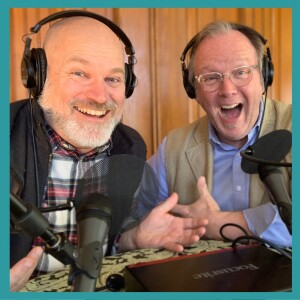
Stories, science and secrets from the world’s brightest thought-leaders. Behavioral Grooves is the podcast that satisfies your curiosity of why we do what we do. Explanations of human behavior that will improve your relationships, your wellbeing, and your organization by helping you find your groove.
Episodes

Sunday Jun 04, 2023
How We’re Missing The Point With The Gender Pay Gap | Alex Imas PhD
Sunday Jun 04, 2023
Sunday Jun 04, 2023
If you compare executive pay of men and women in C suite jobs, you will often not find a discrepancy in their wages. You will also be completely missing the point. The gender pay gap exists because it is more difficult for women to reach executive level success. Throughout their career progression, but particularly early on, women face more discrimination than men, and so fewer women are ultimately promoted to the highest level of an organization.
Gender discrimination is one of the recent topics covered by Alex Imas PhD, in his research. Alex is a behavioral economist with a focus on dynamic decision-making. His research explores topics related to choice under uncertainty, discrimination, mental representation, and how people learn from information.
Most recently, Alex has been the recipient of the 2023 Alfred P. Sloan Research Fellowship which seeks to stimulate fundamental research by early-career scientists and scholars of outstanding promise.
Alex’s work on discrimination in the workplace sheds vital light on the cause of the problem which isn’t just found within the hiring process. But before Kurt and Tim discuss this topic with Alex, the conversation kicks off with the fascinating findings that have fed off Robert Cialdini’s founding work - that scarcity drives consumer demand.
It was back in episode 71, that Alex was originally a guest on Behavioral Grooves. And Tim was more than happy to rekindle the initial musical discussion around Tom Waits and Bob Dylan. But Alex also delights us with how the pandemic altered his listening behavior and opened him up to some new favorite bands.
Topics
(4:59) Welcome and speed round questions.
(7:!8) How exclusivity can drive demand.
(14:56) Access desire is the key to driving demand.
(16:50) What are Alex’s plans with being awarded the Sloan Fellowship?
(21:41) Integrating behavioral science into the workplace.
(26:17) The latest research on gender discrimination in the workplace.
(32:11) Why looking at salaries for men and women doing the same job is not enough.
(36:20) How algorithms can exacerbate and scale biases.
(40:20) How Tom Waits’ music has inspired Alex to explore new areas of creativity.
(47:38) Grooving Session with Kurt and Tim on discrimination.
© 2023 Behavioral Grooves
Links
Alex Imas: http://www.aleximas.com/
NBER: https://www.nber.org/
Episode 355, Want Marketing That’s Effective? Use a Behavioral Science Perspective | Nancy Harhut: https://behavioralgrooves.com/episode/marketing-using-behavioral-science/
Episode 71, Alex Imas: Clawback Incentives and Tom Waits: https://behavioralgrooves.com/episode/alex-imas-clawback-incentives-and-tom-waits/
Alex Imas & Kristóf Madarász (2022) “Superiority-Seeking and the Preference for Exclusion”: https://www.nber.org/papers/w30334
Episode 226, The Power of Unity: Robert Cialdini Expands His Best Selling Book Influence: https://behavioralgrooves.com/episode/cialdini-unity-in-influence/
Benjamin Handel: https://www.benjaminhandel.com/
Imas, J. A. Bohren and M. Rosenberg (2019) "The Dynamics of Discrimination: Theory and Evidence," American Economic Review: https://static1.squarespace.com/static/57967bc7cd0f68048126361d/t/5cdf2d4c7d1b310001d046fc/1558129997622/BohrenImasRosenberg_DynamicsDiscrimination_January2019.pdf
Episode 293, Women Do Too Much Non-Promotable Work: How To Say No More with Linda Babcock: https://behavioralgrooves.com/episode/women-do-too-much/
Episode 204, How Shellye Archambeau Flies Like an Eagle: https://behavioralgrooves.com/episode/shellye-archambeau-like-an-eagle/
Musical Links
Tom Waits “Downtown Train”: https://www.youtube.com/watch?v=rLtZKkCIVmI
Bob Dylan “My Back Pages”: https://www.youtube.com/watch?v=92cF_KCH7TU
Bob Dylan “Johanna”: https://www.youtube.com/watch?v=AwuCF5lYqEE
Yeah, Yeah, Yeahs “Way Out”: https://www.youtube.com/watch?v=Jh3DXuNH9A0
The Strokes “Last Nite”: https://www.youtube.com/watch?v=TOypSnKFHrE
The Vines “Get Free”: https://www.youtube.com/watch?v=asOvnGHwtDU
The White Stripes “Seven Nation Army”: https://www.youtube.com/watch?v=0J2QdDbelmY
Fontaines D.C. “Jackie Down The Line”: https://www.youtube.com/watch?v=3AoOfJP3r40
Bright Eyes “First Day of My Life”: https://www.youtube.com/watch?v=xUBYzpCNQ1I

Monday May 29, 2023
Want People To Comply With Rules? Start With Trust | Christian Hunt
Monday May 29, 2023
Monday May 29, 2023
Want people to comply with rules at work? Stop assuming that they are going to break the rules. The vast majority of people want to do the right thing. So if you’re finding that people aren’t complying, you’ve got a rule problem, not a people problem.
Our expert guest and friend of the show, Christian Hunt turns compliance on its head in this episode:
“I thought compliance was all about rules and regulations, which it is, but that is the organization's perspective on it. The organization needs to comply with these rules. That's the organization’s challenge. But to get that solved, you’ve got to be thinking about things from the perspective of the people that are going to deliver or not deliver that mission.”
Thinking about the people behind the rules is the crux of Christian’s new book “Humanizing Rules: Bringing Behavioural Science to Ethics and Compliance”, which we are thrilled to be discussing on this episode of Behavioral Grooves.
We’ve had the pleasure of recording with Christian a number of times. Most notably at the Abbey Road Studios in London where we talked about the risks and benefits of cheating in episode 326. We have also delved into how to not outsource your critical thinking during in episode 122, as well as covering the 5 principles of human risk - in other words, the myths that humans cling to that don’t help us - way back in episode 86. And most recently, Christian joined in our conversation in episode 339, giving very practical tips on how to read a book quickly.
Christians is a fellow podcaster, hosting a fantastic show called The Human Risk Podcast (you should definitely take a listen) which explores the idea of human decision-making as a risk and what we can do to mitigate it.
Unbelievably, despite this being the 5th time on Behavioral Grooves, this is the first time we get to hear Christian’s musical picks. And as always, this part of the discussion reveals a bit more about our guest that we didn’t know before.
Topics
(4:33) Welcome and speed round questions.
(7:02) Should rules be designed for bad people or good people?
(12:24) Why Compliance Officer is the worst job title!
(15:31) Christian’s journey into compliance.
(20:24) Don’t focus on what you'd like people to do, but focus on what people are likely to do.
(24:12) The difference between recoverable and irrecoverable issues.
(27:44) Just because you can, doesn’t mean you should.
(31:06) People problem or rule problem?
(34:27) Who the hell is Mr Logic?
(43:13) How to get people to pay attention to compliance.
(47:19) Learning about compliance from sexologists!
(53:01) What music would Christian take to a desert island?
(58:32) Grooving Session with Kurt and Tim on compliance.
© 2023 Behavioral Grooves
Links
Human Risk Podcast: https://www.humanriskpodcast.com/
Christian’s book, “Humanizing Rules: Bringing Behavioural Science to Ethics and Compliance”: https://amzn.to/428gp8s
Episode 326, Grooving on Cheating: Kurt, Tim, Christian Hunt, and Koen Smets: https://behavioralgrooves.com/episode/grooving-on-cheating/
Episode 122, Don’t Outsource Your Critical Thinking with Christian Hunt: https://behavioralgrooves.com/episode/c-19-dont-outsource-your-critical-thinking-with-christian-hunt/
Episode 86, Christian Hunt: Mitigating Human Risk and The Algorithmic Mind: https://behavioralgrooves.com/episode/christian-hunt-mitigating-human-risk-and-the-algorithmic-mind/
Episode 339, Top 2 Tips on How to Read a Book Quickly: https://behavioralgrooves.com/episode/how-to-read-a-book-quickly/
Mr Logic: https://www.youtube.com/watch?v=ab6yslxLRyQ&ab_channel=ViolenceMatters
Human Risk and the sexologist, Jill McDevitt: https://www.humanriskpodcast.com/sexologist-dr-jill-mcdevitt-on/
Herbert Grönemeyer: https://www.groenemeyer.de/
Happy 60th, Herbert Grönemeyer: https://www.dw.com/en/herbert-gr%C3%B6nemeyer-germanys-most-successful-musician-turns-60/a-19180054
Behavioral Grooves Patreon: https://www.patreon.com/behavioralgrooves
Musical Links
The Beatles “I Feel Fine”: https://www.youtube.com/watch?v=WrAV5EVI4tU
Herbert Grönemeyer singt "Bochum" live im Stadion: https://www.youtube.com/watch?v=AFRQQCZglwI
![Grooving on Goals: The Magic of Goals [Republish: Episode 27]](https://pbcdn1.podbean.com/imglogo/ep-logo/pbblog2137480/emotional_feeling_square_300x300.jpeg)
Wednesday May 24, 2023
Grooving on Goals: The Magic of Goals [Republish: Episode 27]
Wednesday May 24, 2023
Wednesday May 24, 2023
Goals are as common and as misunderstood as mobile phones. We think we know how to use them, but we don’t get it right every time. And if we were asked to explain how they work, we’d be clueless.
In this Grooving Session, Kurt and Tim discuss the magic of goals and how to best utilize them. We discuss some goal-setting studies – both published and unpublished – and some fundamental reasons why goals are important. We also get into some complementary research on the illusionary progress to goal and the goal gradient theory, both linked to the work of Ran Kivetz, from Columbia University. It’s a quick discussion of some important applications of how to make goals work better for YOU!
CONTEST ALERT! And as a special thank-you, we’re going to select a single listener to be our special guest on a future podcast. To let us know you’re interested in being our special guest, use #IWANTTOBEYOURSPECIALGUEST when you forward this episode on LinkedIn, Twitter or Facebook and we’ll select a winner. We want YOU to be our special guest to hear YOUR questions about behavioral sciences.
This is a republished episode that was originally episode 27 of Behavioral Grooves, back in September 2018 (yes Tim and Kurt really have been podcasting that long!) But we felt the content of this episode was timeless.
And the offer of being a guest on the show? Yes, we still mean it! Share the hashtag and come join Kurt and Tim on a future episode!
© 2023 Behavioral Grooves

Sunday May 14, 2023
Groove Track | Why It Takes More Than Willpower To Reach Your Goals
Sunday May 14, 2023
Sunday May 14, 2023
Between setting your goals and reaching your goals, there is a void that we assume willpower can fill. But to achieve success, it takes more than willpower alone. Thankfully there are some well researched tools that we can set in place to help us flourish.
Hosts of Behavioral Grooves Kurt Nelson and Tim Houlihan sit down for a succinct Groove Track episode summarizing the myths about willpower, what other factors are at play when striving for our goals, and the tools we can use to help us succeed.
Key takeaways:
- Willpower is not enough on its own.
- Your environment - both your physical and social contexts - influence your behavior.
- Routines can help you achieve your goals.
And routines work best when they:
- Fit into our lifestyle.
- Focus on the steps to the goal.
- Fuel consistency.
- Provide intrinsic or extrinsic reward.
And tools are useful to:
- Help remind and motivate.
- Assist with planning and strategizing.
- Track and measure our progress.
© 2023 Behavioral Grooves
Links
Mazuch & Rona (2005), “Creating healing environments: humanistic architecture and therapeutic design”: https://www.proquest.com/scholarly-journals/creating-healing-environments-humanistic/docview/212385610/se-2
McMains & Kastner (2011), “Interactions of top-down and bottom-up mechanisms in human visual cortex”: https://pubmed.ncbi.nlm.nih.gov/21228167/
Wendy Wood, “Good Habits, Bad Habits: The Science of Making Positive Changes That Stick”: https://amzn.to/3LTMlYl
Katy Milkman, “How to Change: The Science of Getting from Where You Are to Where You Want to Be”: https://amzn.to/3pzBb3t
The Brain/Shift Journal - Scientifically Proven Guided Journal for Goal Setting and Achieving: A 13-Week Undated Planner, Organizer, and Notebook for Personal Productivity: https://amzn.to/42rjilP

Sunday May 07, 2023
Why Random Rewards Feel So Much Better Than Earned Ones with Richard Shotton
Sunday May 07, 2023
Sunday May 07, 2023
Earning your 10th cup of coffee for free isn’t nearly as satisfying as being randomly awarded a free coffee from your barista. These uncertain rewards are a genius way of enforcing new habits, which our guest Richard Shotton outlines in his fantastic new book.
In fact, Richard’s book “The Illusion of Choice: 16 ½ psychological biases that influence what we buy" is a treasure trove of research and anecdotes which bridge the gap between the very technical world of academia and the “wild” application of behavioral science in real world marketing.
Kurt and Tim don’t delve into all 16 ½ psychological biases from the book, but their conversation with Richard jumps into some fascinating topics. Among them are the seemingly contradictory chapters in Richard’s book that are titled “Make It Easy” and “Make It Difficult”. So which is it - should we add or remove friction to products? In fact, it’s both! And (as we love to say on Behavioral Grooves) it depends on the context and ultimately what your marketing goal is.
“You've got to be very clear about what is the barrier, or what is the problem you are trying to resolve as a marketer. And once you're clear about that, then it's easy to match the right behavioral science experiment, and therefore the right recommendation to that problem.”
We discuss the power of simple, concrete language; why we perceive precise numbers to be more accurate; and how authoritarian language can discourage customers, employees and possibly citizens.
As mentioned in the show, we were recently honored to be awarded the 2023 Behavioral Science Podcast of the Year by GAABS. Thank you to the wonderful team at GAABS, and all our listeners who made this possible, we really appreciate your ongoing support.
Topics
(5:33) Welcome and speed round question.
(7:57) Why randomly being awarded a coffee is so satisfying.
(13:00) Closing the gap between academia and applied behavioral science.
(15:12) The power of concrete over abstract words.
(20:48) Breaking prices down to unit price is perceived as better value.
(24:32) How precise pricing increases the acceptance rate.
(28:38) Why simple language is so important.
(33:40) When is it best to increase friction and when should you remove friction?
(40:44) Is there actually a replication “crisis” in behavioral science?
(42:48) Authoritarian messages could have a negative effect on customers and employees.
(47:36) What musical artists would Richard take to a desert island?
(52:20) Grooving Session with Kurt and Tim on Richard’s work.
© 2023 Behavioral Grooves
Links
GAABS: https://gaabs.org/
Richard Shotton’s book “The Illusion of Choice: 16 ½ psychological biases that influence what we buy”: https://amzn.to/3LxOCs5
Astroten: https://www.astroten.co.uk/
Dishoom restaurant: https://www.dishoom.com/
Ian Begg (1972) “Recall of meaningful phrases”, Journal of Verbal Learning and Verbal Behaviour: https://www.sciencedirect.com/science/article/abs/pii/S0022537172800240
Robert Schindler & Richard Yalch (2006), “It Seems Factual, But Is It? Effects of Using Sharp versus Round Numbers in Advertising Claims” Advances in Consumer Research: https://www.researchgate.net/publication/279544736_It_Seems_Factual_But_Is_It_Effects_of_Using_Sharp_versus_Round_Numbers_in_Advertising_Claims
Episode 64, Danny Oppenheimer: Governance and Helicopter Parenting: https://behavioralgrooves.com/episode/danny-oppenheimer-governance-and-helicopter-parenting/
Daniel Oppenheimer (2006) “Consequences of Erudite Vernacular Utilized Irrespective of Necessity: Problems with Using Long Words Needlessly” Applied Cognitive Psychology: https://www.researchgate.net/publication/227513726_Consequences_of_erudite_vernacular_utilized_irrespective_of_necessity_Problems_with_using_long_words_needlessly
Ig Nobel Prizel: https://en.wikipedia.org/wiki/Ig_Nobel_Prize
The IKEA effect: https://thedecisionlab.com/biases/ikea-effect#:~:text=The%20IKEA%20effect%2C%20named%20after,expended%20effort%20to%20create%20them.
Felicia Pratto & Oliver John (1991) “The attention-grabbing power of negative social information”: https://www.researchgate.net/publication/21213504_Automatic_Vigilance_The_Attention-Grabbing_Power_of_Negative_Social_Information
Episode 350, How One Small Word Can Transform Our Motivation, Success And Relationships | Jonah Berger: https://behavioralgrooves.com/episode/words-can-transform-jonah-berger/
Variable Ratio Reinforcement: https://practicalpie.com/variable-ratio-reinforcement/
Behavioral Grooves Patreon: https://www.patreon.com/behavioralgrooves
Musical Links
David Bowie “Starman”: https://www.youtube.com/watch?v=tRcPA7Fzebw&pp=ygUTZGF2aWQgYm93aWUgc3Rhcm1hbg%3D%3D
The Strokes “Last Night”: https://www.youtube.com/watch?v=TOypSnKFHrE&pp=ygULdGhlIHN0cm9rZXM%3D
The Verve “Bitter Sweet Symphony”: https://www.youtube.com/watch?v=1lyu1KKwC74&ab_channel=TheVerveVEVO
The Cure “Pictures Of You”: https://www.youtube.com/watch?v=UmFFTkjs-O0&ab_channel=TheCureVEVO
Wonder Stuff “Don’t Let Me Down Gently”: https://www.youtube.com/watch?v=SIKUZjc4gVo&ab_channel=TheWonderStuffVEVO
Stone Roses “I Wanna Be Adored”: https://www.youtube.com/watch?v=4D2qcbu26gs&pp=ygULc3RvbmUgcm9zZXM%3D
John Prine “I Remember Everything”: https://www.youtube.com/watch?v=Ww1SenQwaMg
Public Enemy “Fight The Power”: https://www.youtube.com/watch?v=2WHe5fxS3dA&ab_channel=UPROXXVideo

Sunday Apr 30, 2023
Sunday Apr 30, 2023
Interested in a secret, underused marketing trick? Use rhyme in your design! You may easily recall examples like “Bounty: the quicker picker upper” or “Duracell: no battery is stronger, longer”. By including rhyming words in your marketing, your content is actually more memorable and more believable. This is just one of the 25 behavioral science tips that our expert guest, Nancy Harhut outlines in her comprehensive new book, “Using Behavioral Science in Marketing”.
Nancy Harhutt is Co-Founder and Chief Creative Officer at HBT Marketing, a consultancy that specializes in applying human behavior techniques to marketing. Her new book Using Behavioral Science in Marketing: Drive Customer Action and Loyalty by Prompting Instinctive Responses is an easy-to-use guide on how to apply behavioral insights.
“Behavioral science is tailor made for marketing. At the end of the day, marketers are trying to convince people to do something, we're trying to influence behavior.”
While Nancy’s book is written for those in the marketing field, it is applicable to anyone trying to negotiate, influence or strategize with others. One of the things that makes the book such a helpful guide is Nancy’s use of industry stories to illustrate the effectiveness of her applied behavioral science techniques, and she shares some of these with us in our discussion.
Kurt and Tim talk with Nancy about the weightiness of temporal landmarks, such as birthdays and fresh starts; why rhyming is an underused secret in marketing; and the reason why the reciprocity principle can be so effective with clients.
Whether your job title is in marketing or you frequently find yourself trying to influence others behavior, you will gain some useful insight from Nancy’s interview. If you are a regular listener of Behavioral Grooves, please consider becoming a supporter too, through the Behavioral Grooves Pateron page.
Topics
(3:24) Welcome and speed round questions.
(6:11) How behavioral science can be incredibly useful in marketing.
(9:04) How Nancy first used the autonomy bias in a marketing campaign.
(13:43) How do you measure marketing results?
(17:28) What are the differences between labeling and framing?
(24:14) The secret of rhyming in marketing.
(30:29) How birthdays can impact our behavior.
(36:00) Is marketing missing any tricks?
(43:29) How the default settings on Spotify changed.
(49:05) What music would Nancy take to a desert island?
(51:32) Grooving Session with Kurt and Tim.
© 2023 Behavioral Grooves
Links
Nancy Harhut’s book: “Using Behavioral Science in Marketing: Drive Customer Action and Loyalty by Prompting Instinctive Responses”: https://amzn.to/41CAC72
Nancy Harhut: https://www.linkedin.com/in/nancyharhut
Stephen Sondheim: https://en.wikipedia.org/wiki/Stephen_Sondheim
Frank Lesser: https://www.franklesser.com/
Stephen Schwartz: https://stephenschwartz.com/
Episode 351, How One Small Word Can Transform Our Motivation, Success And Relationships with Jonah Berger: https://behavioralgrooves.com/episode/words-can-transform-jonah-berger/
Ogilvy: https://www.ogilvy.com/
Behavioral Grooves Patreon: https://www.patreon.com/behavioralgrooves
Musical Links
West Side Story “Maria”: https://www.youtube.com/watch?v=39WPioTx1zQ
The Beatles “Help”: https://www.youtube.com/watch?v=2Q_ZzBGPdqE
Wicked “Defying Gravity”: https://www.youtube.com/watch?v=fEq3xM-i0Ng

Sunday Apr 23, 2023
Can Psychology Tell Us What Makes A Good Life? With Paul Bloom, Part 2
Sunday Apr 23, 2023
Sunday Apr 23, 2023
Is a happy life one that is abundant with pleasure? Or one without pain? Or one that overcomes struggle? The quest for a good life may go beyond the scope of a psychological study. But bestselling author, Paul Bloom does believe that psychology can help us maximize the circumstances that contribute to our happiness.
In the second part of our interview with psychologist Paul Bloom we delve more into his book “Psych: The Story of the Human Mind”. Not only do we discuss the factors that lead to a happy life, we talk to Paul about the evolution of selfish versus altruistic behaviors, the ongoing debate between nature versus nurture, how maximizers and satisficers differ and what exactly hypophobia is.
If you’d like to listen to the first part of Paul’s interview, tune in to episode 352 and you'll also enjoy our previous discussion with Paul about his book, The Sweet Spot in episode 241.
Become a podcast follower of Behavioral Grooves and you will automatically be notified when our new weekly episodes go live.
Topics
(2:23) Why Paul hasn’t written a psychology textbook.
(5:03) The evolution of kindness and selfishness.
(11:57) Nature vs. nurture.
(15:30) Why do we care more about our differences than our similarities?
(18:07) Maximizers vs. satisficers?
(20:28) Is language infinite in principle, but finite in practice?
(22:19) What is a good life?
(27:34) Do a lot of our politicians have hypophobia (lack of fear)?
(30:47) What music would Paul take to a desert island?
(34:30) Grooving Session with Kurt and Tim.
© 2023 Behavioral Grooves
Links
Episode 352, Psychology: Should Freud Still Be On The Syllabus? Paul Bloom, Part 1: https://behavioralgrooves.com/episode/psychology-freud-on-the-syllabus/
Paul Bloom’s book “Psych: The Story of the Human Mind”: https://amzn.to/3MF6raM
Episode 241 with Paul Bloom, Why Finding Pleasure in Life is a Painful Journey: https://behavioralgrooves.com/episode/pleasure-is-a-painful-journey/
Lila Gleitman: https://en.wikipedia.org/wiki/Lila_R._Gleitman
Noam Chomsky: https://en.wikipedia.org/wiki/Noam_Chomsky
Randolph Nesse: https://www.randolphnesse.com/
Musical Links
The White Lotus Soundtrack “I Want to Live”: https://www.youtube.com/watch?v=8I9ffEzCPIA
Elton John “The Last Song”: https://www.youtube.com/watch?v=R5eEQJZm7ZM
David Bowie “Changes”: https://www.youtube.com/watch?v=4BgF7Y3q-as
Tracey Chapman “Fast Car”: https://www.youtube.com/watch?v=AIOAlaACuv4
Joan Armatrading “Already There”: https://www.youtube.com/watch?v=ChMcN0ke1eA
Suzanne Vega “Walk on The Wild Side”: https://www.youtube.com/watch?v=pEXGLRLhWls
Led Zeppelin “Stairway to Heaven”: https://www.youtube.com/watch?v=Ly6ZhQVnVow
Pink Floyd “Time”: https://www.youtube.com/watch?v=Qr0-7Ds79zo

Monday Apr 17, 2023
Psychology: Should Freud Still Be On The Syllabus? Paul Bloom, Part 1
Monday Apr 17, 2023
Monday Apr 17, 2023
Ask someone to name a famous psychologist and there’s a good chance they’ll say Sigmund Freud. Describing a person as “anal” or rebuking someone with “I'm not your mother”, are both references to Freud’s work. Since many of his outlandish theories have long been debunked, should he still be part of psychology teaching? Author Paul Bloom lays the case for why he has dedicated a whole chapter to Freud in his new book Psych.
This is the first of two episodes with Paul Bloom, who we are warmly welcoming back to the Behavioral Grooves Podcast following his previous interview in episode 274 back in 2022. Paul joins us to discuss his new book, Psych: The Story of the Human Mind. And since we had such a fascinating (and long!) conversation with Paul, we decided to break it into two, more digestible, episodes.
In this first episode, we spend time discussing the history of psychology, delving into the importance of Freud, Skinner and Milgram and the impact that behaviorism had. We also jump to the hypothetical future of psychology and where the field may make seismic progress over the next 50 years.
By becoming a follower of Behavioral Grooves Podcast, you will automatically be notified when the second episode of Paul’s interview is released next week, on Monday, April 24th. In that interview, we will delve more into Paul’s book. We will talk about the impetus to write Psych, selfish vs altruistic behaviors, and what makes a good life.
Topics
(5:00) Welcome to Paul Bloom and speed round questions.
(9:33) Why Paul wrote the book Psych.
(12:15) Why Sigmund Freud had a whole chapter in the book.
(18:08) The reason Paul doesn’t have much love for B.F. Skinner.
(25:09) Milgram experiments during a wild west time in psychology.
(29:33) Do we have free will?
(33:42) How will the field of psychology change over the next 50 years?
(37:49) The failures of neuroscience.
(42:41) Grooving Session with Kurt and Tim on the history of psychology.
© 2023 Behavioral Grooves
Links
Paul Bloom’s book “Psych: The Story of the Human Mind”: https://amzn.to/3MF6raM
Episode 274 with Paul Bloom, Why Finding Pleasure in Life is a Painful Journey: https://behavioralgrooves.com/episode/pleasure-is-a-painful-journey/
Sigmund Freud: https://en.wikipedia.org/wiki/Sigmund_Freud
Episode 67, George Loewenstein: On a Functional Theory of Boredom: https://behavioralgrooves.com/episode/george-loewenstein-on-a-functional-theory-of-boredom/
Carl Jung: https://en.wikipedia.org/wiki/Carl_Jung
B.F. Skinner: https://en.wikipedia.org/wiki/B._F._Skinner
Episode 247, Stanford Prison Experiment, 50 Years On: What Have We Really Learnt? With Dr Philip Zimbardo: https://behavioralgrooves.com/episode/stanford-prison-experiment/
Stanley Milgram experiment: https://en.wikipedia.org/wiki/Milgram_experiment
Episode 312, How To Find Meaning IN Life | Dr Brian Lowery PhD: https://behavioralgrooves.com/episode/meaning-in-life-brian-lowery/
Episode 248, Do We Control Situations or Do Situations Control Us? With John Bargh: https://behavioralgrooves.com/episode/control-situations-with-john-bargh/

Monday Apr 10, 2023
Monday Apr 10, 2023
With curiosity we can figure out what we actually want. Sometimes what we desire makes us feel uncomfortable, and as a therapist, our guest Charlotte Fox Weber makes space for that discomfort. Join us as she highlights her observations from the therapist's chair.
“I think curiosity is a life force. It engages us, it galvanizes us, it's inspiring, and it gets us to pay attention.” ~ Charlotte Fox Weber
Many people see a therapist to help them work through psychological issues. But have you ever considered what the dynamic is like from the point of view of the therapist? If you were a fly on the wall, what would you observe behind the closed doors?
Charlotte Fox Weber brings a unique perspective to the therapist-client relationship. Her new book “Tell Me What You Want: A Therapist and Her Clients Explore Our 12 Deepest Desires”: https://amzn.to/3ZJ9XUl, expertly pulls out recurring themes from her years as a therapist which are beautifully illustrated with captivating stories.
According to Charlotte, we each have 12 fundamental psychological needs that we all share but often hide. These universal desires are: to love and be loved; understanding, power, attention, freedom; to create, to belong, to win, to connect, to control; and to want what we shouldn’t. With her experience as a therapist, Charlotte is aiming to help us navigate our desires through curiosity and authenticity. If we can more accurately acknowledge what we actually want, we can live a more fulfilled life.
“The 12 desires I describe, all have to do with recognition.” ~ Charlotte Fox Weber
Our interview with Charlotte was recorded a few weeks ago when Tim Houlihan was unwell, so our producer Mary Kaliff joins Kurt on this episode as co-host of the show. But you’ll be pleased to know that Tim is doing much better now and you’ll be hearing his familiar voice on all upcoming episodes again!
Topics
(1:56) Welcome and speed round questions.
(4:09) Why is it so hard for us to say what we want?
(8:14) Why curiosity is so important in therapy.
(11:37) The 12 desires that we each experience.
(13:27) Do we have desires that stay consistent throughout our life?
(18:22) How do we reconcile all of our identities?
(20:14) Why do we struggle holding two truths simultaneously?
(25:42) How jazz music helps us appreciate the notes unplayed.
(29:50) Of the 12 desires, which one makes us most uncomfortable?
(33:53) The cost of giving or paying attention.
(36:39) Grooving session with Kurt and Mary.
© 2023 Behavioral Grooves
Links
Charlotte Fox Weber: https://charlottefoxweber.com/
Charlotte’s book: “Tell Me What You Want: A Therapist and Her Clients Explore Our 12 Deepest Desires”: https://amzn.to/3ZJ9XUl
Shankar Vedantam TED Talk “You don't actually know what your future self wants”: https://www.youtube.com/watch?v=dtfaccGmCCs
Episode 325, Can You Unlearn History And Still Love Your Country? With Dolly Chugh: https://behavioralgrooves.com/episode/dolly-chugh/
Episode 178, Kwame Christian: On Compassionate Curiosity, Social Justice Conversations, and Cinnamon Toast Crunch: https://behavioralgrooves.com/episode/kwame-christian-on-compassionate-curiosity-social-justice-conversations-and-cinnamon-toast-crunch/
Episode 344, How To Frame Incentives To Drive The Desired Behavior with James Castello: https://behavioralgrooves.com/episode/incentives-to-drive-behavior/
Episode 237, Attention: How to Capture It and Keep It with Ben Parr: https://behavioralgrooves.com/episode/attention-with-ben-parr/
Episode 303, From Distracted To Focused: Nir Eyal’s Secrets On How To Be Indistractable: https://behavioralgrooves.com/episode/nir-eyal-how-to-be-indistractable/
Behavioral Grooves Patreon: https://www.patreon.com/behavioralgrooves
Musical Links
Nina Simone “Feeling Good”: https://www.youtube.com/watch?v=oHRNrgDIJfo

Monday Apr 03, 2023
Monday Apr 03, 2023
Words matter. Unbelievably, tiny changes to language can have a big effect on behavior. Hear bestselling author, Jonah Berger reveal the magic words that can completely transform how we behave, in this riveting episode.
Almost everything we do involves words. But have you ever stopped to consider how much influence the words you choose can have on the person reading your email, or listening to your presentation? Some words are more impactful than others. In fact, we can captivate, motivate and convince people with our words. But which words are the most powerful?
Listen in to find out:
- How words can shape our identity.
- Tips on using language to positively affect our relationships.
- How simply changing the words in an email can dramatically alter behavior.
Jonah Berger’s last book, “Magic Words: What To Say To Get Your Way” is a succinct summary of the latest scientific research on words and language. Jonah joins us on Behavioral Grooves, not only to tell us about what to expect in the book, but also to recount the story of how the idea for the book was sparked by a delayed flight.
Jonah is a former guest of Behavioral Grooves Podcast, having previously been on the show to discuss his bestselling book The Catalyst: How to Change Anyone's Mind. He is a professor at The Wharton School at the University of Pennsylvania and is known as a world-renowned expert on natural language processing, word of mouth, influence, consumer behavior, and why things catch on.
Word of mouth is the number one way that new listeners find out about Behavioral Grooves podcast. If you feel wiser having listened to this episode, please share it on social media or email it to your friends and encourage them to become a listener too. Thank you!
Topics
(3:27) Welcome and speed round questions.
(5:09) Why asking for advice makes us actually seem smarter.
(7:17) Using abstract vs. concrete language.
(12:42) How Jonah researched the use of language.
(16:49) How can our language affect our relationships.
(19:31) Turning actions into identities.
(22:47) Priming behavior with language.
(25:00) Do the lyrics of songs help explain their success?
(28:27) Grooving Session with Tim and Kurt on why words matter.
© 2023 Behavioral Grooves
Links
Jonah Berger: https://jonahberger.com/
Jonah’s book, “Magic Words: What To Say To Get Your Way”: https://amzn.to/3Kp9r9T
Episode 201, The Counterintuitive Persuasion of The Catalyst with Jonah Berger: https://behavioralgrooves.com/episode/the-catalyst-with-jonah-berger/
Episode 147, Gary Latham, PhD: Goal Setting, Prompts, Priming, and Skepticism: https://behavioralgrooves.com/episode/gary-latham-goal-setting-prompts/
Episode 319, John Bargh: Want to Know How Priming Works? It Starts With Your Conscious, Not Your Unconscious: https://www.youtube.com/watch?v=4B_UYYPb-Gk&ab_channel=RUNDMCVEVO
Leonardelli, Geoffrey & Pickett, Cynthia & Brewer, Marilynn. (2010). Optimal Distinctiveness Theory. Advances in Experimental Social Psychology: https://www.researchgate.net/publication/241065845_Optimal_Distinctiveness_Theory
Behavioral Grooves Patreon: https://www.patreon.com/behavioralgrooves
Musical Links
Suzanne Vega, DNA “Tom's Diner”: https://www.youtube.com/watch?v=j4jtIDaeaWI
RUN DMC - Walk This Way featuring Aerosmith: https://www.youtube.com/watch?v=4B_UYYPb-Gk&ab_channel=RUNDMCVEVO
